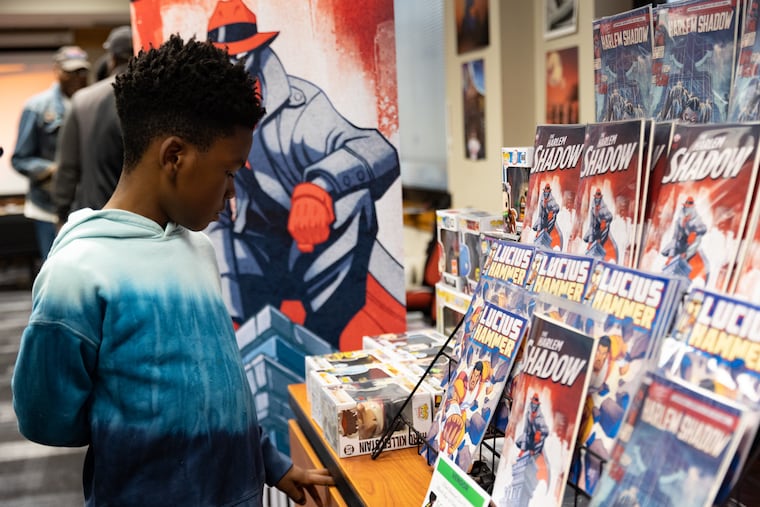The East Coast Black Age of Comics Convention celebrates 22 years of connecting Black comic book creators with fans
Started by Yumy Odom in 2002, the event took place last weekend at Temple University, highlighting Philadelphia’s longstanding connection to Black comic book creatives.

Lynne Marie Finley became fascinated by comic book heroes when she was young. Luke Cage and Misty Night, two of Marvel’s first Black superheroes that came after Black Panther in the 70s, first grabbed her attention. But when Finley, now 47, first saw Storm from the X-Men comics with her Black skin and silver hair, it was “striking.”
When Finley came from her home in Maryland to Philadelphia last weekend for the 22nd Annual East Coast Black Age of Comics Convention, there was only one character for her to dress up as.
“They didn’t throw her in there just for diversity’s sake,” she said, referencing Storm’s critical role in one of Marvel’s most successful franchises. “They had some plans [for her].”
ECBACC is an annual gathering in Philadelphia for creators and fans of Black comic books and fantasy, bringing in people from across the country. Finley is a regular here, taking in the comic book vendors, panel discussions, and cosplay competitions each year with everyone else.
“[You] get to see images that look like us ... A lot of the other cons, you don’t see a lot of Black art and Black characters,” Finley said.
“You get to find something a little different and something that looks like you.”
Centering comic creators
In 1988, as Yumy Odom first arrived in Philadelphia, he noticed that the comic book creator and fan community here was not very connected. “I don’t think that [people] knew they had that many creators in this one city,” he said.
Odom has been a comic book fan since he was a boy in New York. His mother gave him several issues of X-Men, Fantastic Four, and other comics to read while he was hospitalized with an arm injury, and he’s been dedicated to them ever since.
He’s a sort of comic book historian, pointing out how Philadelphia was home to the first comic book to be created by, and featuring, all Black people — the single issue All Negro Comics — in 1947.
A decade after completing his master’s thesis on Black comics at Temple, Odom started ECBACC in 2002 with a few colleagues, aiming to continue building connections between Black comic book creators and fans. He believes comics can be used to increase literacy in Black communities too, and wants to help support the people who are writing and drawing those stories.
“This is both [for the fan and the creator], but we center the creator. Most of the other [conventions], the corporate ones, their focus is really making money, which is not a bad thing. But our focus is actually promoting the people who make the work,” he said.
“A lot of the other cons, you don’t see a lot of Black art and Black characters.”
The best-known comic convention is San Diego’s Comic-Con, which attracts attendees from around the world and pulls in tens of millions of dollars of revenue. But Odom says that while ECBACC operates on a much smaller scale, its impact on the Black comic community is just as great.
“We don’t just buy and sell, we actually have a mission that we follow. And anybody discussing Black comics, they [have to] talk about ECBACC.”
Beyond its panels and booths, ECBACC also conducts workshops, so that budding and experienced creators can hone their drawing and writing skills. “My main thing [is] helping people who wanted to make books do what they wanted to do,” Odom said.
He is proud of the people who have worked with and received EBACC awards. “We have folks who are now at Disney, they’re at BET, they’re all over the place. They’re at Marvel and they’re at DC [Comics].”
The next generation of comic book creators includes Bryce Bullock, 14, from Delaware, who was selling issues of his own comic book series —Daddy Long Legs and the Inchworm— last weekend. The idea for a Spider-Man-inspired hero just popped in his head one day, and he told his mother, “hey, I came up with a superhero.”
In Bullock’s story, a father and son fall into contaminated water, giving them insect-like powers to stretch their legs and shrink to the size of a bug. They become the comic’s namesake heroes and fight supervillains, like one named Hot Garbage, who created the contaminated water.
A few tables over from Bullock, Damali Beatty was selling her own comics and posters.
“The first books I ever read were comics,” the 26-year-old from West Philly said. Her father, Aaron Beatty, is an artist and illustrator, and has worked for major comic book companies like DC.
She’s been coming to ECBACC ever since she was child.
“I always have people who supported me artistically,” she said.
Beatty’s drawings focus on Black women, usually with a fantasy or horror lens. She likes to experiment with the overlap between the genres, and how they can explore the things that Black women experience. And while she’s just getting started creating her own comic stories, like her “Bestiary” webcomic, Beatty knows she can turn to her father and the rest of the community at ECBACC for support and inspiration.
“We’re all working really hard,” she said.